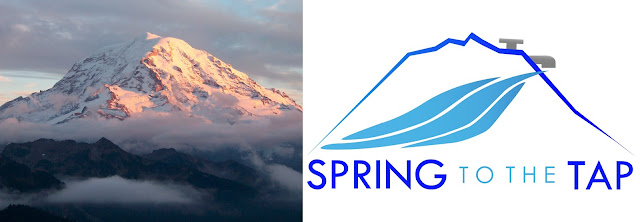 |
| Notice the resemblance? Mount Rainier photo from Mount Rainier National Park's website. |
It appears that Mt. Rainier National Park will first install multiple refilling stations to establish infrastructure which will make it more convenient to opt for the tap, while cooperating with concessions to ensure reusable bottles are available at the park.
"After refill stations and low-cost water bottles are in place, we’ll complete the analysis necessary to make a decision on the sale of bottled water in the park." Randy King says in a quote from Corporate Accountability International's Think Outside the Bottle site.
Randy King also said, "The National Park Service is committed to being a worldwide leader in sustainability. Reducing, reusing and recycling are all steps in the right direction at Mount Rainier National Park. We recognize 'reducing' our footprint as the most important of the 3R's."
The future doesn't look very bright for bottled water, especially at our National Parks, 14 parks have already banned the sale of bottled water. Amidst the growing opposition, the bottled water industry won't go down without a fight.
According to Corporate Accountability International, Coke payed the National Park Foundation $2.5 million over five years for exclusive use of park logos for its advertising, a great asset for greenwashing.
The International Bottled Water Association (IBWA) is pulling out every counter-argument they can think of to try and refute this national trend.
The first argument they employed in a statement on March 28th says that bottled water is the healthiest and most environmnetally friendly drink choice available. "'Efforts to eliminate or reduce access to bottled water in our national parks will force consumers to choose less healthy drink options that have more packaging, more additives (e.g., sugar, caffeine), and greater environmental impacts than bottled water.'"
Apparently the IBWA doesn't recognize tap water as a drink option for consumers. It's easy to say that consumers have to choose an option with more "additives" than water (doesn't everything have more additives than water) if you don't consider tap water as a choice.
The IBWA goes on to cite "research" which states that 63% of people will choose a sugary drink or soda if there is no available bottled water, meaning they will pick soda over tap water. Which further implies that the bottled water industry is righteously empowering consumers with the very best beverage option available, "Bottled water must therefore be available wherever packaged beverages are sold".
The notion that people will choose a sugary drink if no bottled water is available is at least understandable, they don't have a reusable bottle and expect to purchase water instead, and if they can't choose bottled water they choose soda. But if you look at a long term ban this logic only plays into account once (or not at all if one can purchase reusable bottles), you won't keep coming back to the park expecting to buy bottled water and having to buy soda if you know that you can't buy bottled water in the first place. And if we recognize that we're talking about a National Park, there is less of a chance someone would choose soda. With the Mt. Rainier National Park's system (other parks as well) not only will multiple refilling stations be available, but also multiple places to purchase cheap reusable bottles, thus eliminating the thought that people have to choose soda because bottled water is banned.
Another one of IBWA's arguments is that the bottled water industry is "A Good Environmental Steward" (yes, they actually said that). This argument is substantiated with the statement that "All bottled water containers are one-hundred percent recyclable", something I have looked into, and something that is frankly misleading on multiple levels. First plastic is not very good at being recycled, it's not like aluminum or glass which can be infinitely recycled, the chemical makeup of plastic causes it to lose quality over time, resulting in a product that eventually has to be thrown away. And the truth is that less than 40% of bottled water is even recycled in the first place. This is only keying in on the recycling aspect, bottled water harms the environment with production, shipping, and disposal. By IBWA's logic bottled water is actually "...the least environmentally impactful beverage option", because the average weight "...has dropped by 47.7 percent".
IBWA also states that "The bottled water industry supports strong community recycling programs", the key here is "community recycling programs", meaning you putting the bottle in the recycling bin. The beverage industry is strongly opposed to larger community recycling programs (state level) such as bottle bills. Bottled bills are proven to improve recycling, but the Massachusetts bottle bill has faced roadblocks in large committees who received payment from the beverage industry while a few months ago a proposal for a bottle bill in the Northern Territory of Australia was met with legal action from Coca-Cola.
Spring to the Tap supports all efforts to combat the "necessity" of bottled water in our communities, an idea that will only be endorsed by the industry itself. The banning of bottled water in Mt. Rainier National Park impacts more than just the park, it symbolizes the importance of our planet. If we are going to change it has to start at the top (the highest point in the Northwest). Hopefully action will stream down from Mt. Rainier like the fresh water which the mountain provides for the for the region.

The design of the Glasstic is very unique as it is designed with a glass insert on the inside of a durable plastic outer casing that helps protect from breakage. RS Glass Bottle
ReplyDeleteAvoid use of plastic bottles better to use the glass bottles to discover health benefits as plastic bottles are harmful to health because of created from the chemicals.
ReplyDelete